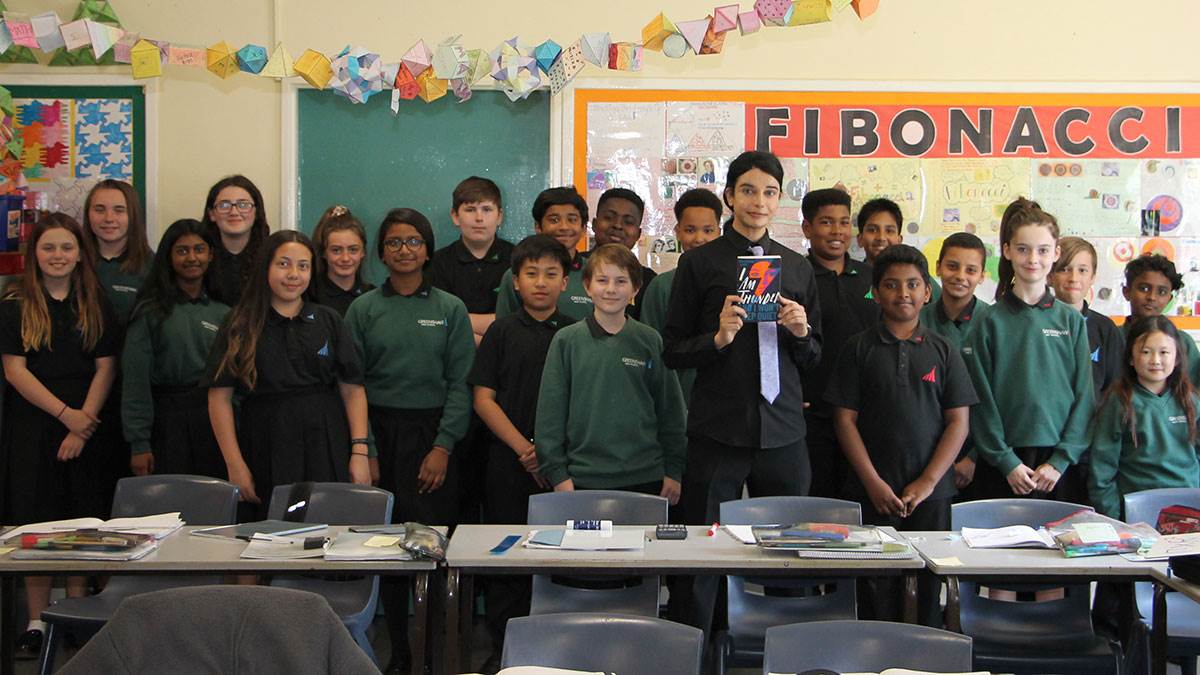'Every one of my students is a potential hero in the making': How Muhammad Khan's class inspired his award-winning book
Published on: 27 June 2019 Author: Muhammad Khan
Muhammad Khan - along with his editor Lucy Pearse - has just won the Branford Boase Award for his story I Am Thunder.
Here, Muhammad reflects on the way books have had an impact on his life, how his students inspired him, and why representation in stories is more important than ever...

Muhammad Khan with his students at Grenshaw High School in Sutton
When I was a toddler, every Saturday (without fail) my mother would take my older sister and me to Balham Library. Lamenting the fact that she struggled to read English, Mum wanted us to develop a deep love for reading from an early age.
Racism was less discreet back then - at the market, Mum often got served last no matter where she stood in the queue. She dreamed education would spare us the hardships she endured.
I remember clinging to my mother koala-like, watching with curiosity as my sister helped herself to colourful library books and sat cross-legged on the reading rug, fully absorbed. Back then children were only allowed four loans, so selection was sometimes a difficult process of elimination.
One Saturday afternoon, my mother put me down to blow her nose and I made a break for freedom! Charging like a runaway train, I made a beeline for the book boxes, plunged both hands in, and staked my claim. Once my mother had convinced me books were for looking at, not chewing, I obediently sat on her lap, mesmerised by the beautiful colours and vibrant characters leaping off every page.
Eager to demonstrate her cleverness, my sister read to us. I soon became her protégé and learned to read for myself. Thus began my lifelong obsession with the power of story.
The Very Hungry Caterpillar was an early favourite. Mum tells me I had the wasteful habit of grazing on a variety of foods without finishing any of them. I can't help but wonder whether this might have been inspired by my caterpillar friend!
At nursery, I found that none of the other children wanted to play with me so I would hide inside a barrel, imagining it was my cocoon, that I might spring from fully transformed into a beautiful butterfly and become the centre of attention. During that time I began to create my own books: little magical portals into other worlds, ones filled with all the friends a lonely child could ever want.
Searching for characters like me
When I was seven, I read my first Paddington book and became an instant fan. For starters, Paddington was as brown as I was. He was well-meaning, yet always managed to get himself in trouble. And he had a secret superpower: a very hard stare. The next time Mum was ignored in a queue, I gave the proprietor a very hard stare, which made him cough. Result!
At high school I was disappointed to find authors with Asian-sounding names often wrote about white characters.
It's not that I couldn't relate - I was happy to read books about aliens and anthropomorphic animals - but the stories did not validate my experiences of being a British Pakistani kid. Was my cultural identity something to be ashamed of?
One rainy afternoon, I discovered two dusty old books by writers of colour in the library: The Friends by Rosa Guy and Rice Without Rain by Minfong Ho. I can't even describe what a seminal moment this was for me. Being 'other' was suddenly cool.
Celebrating today's young heroes
Many years later, as a maths teacher, one of my students asked me why people like us are never the heroes in books. In the intervening years, I had become blind to this lack of representation. Not much had changed since I found those two dusty books, except that now there was even more need for positive representation.
To this day, I believe every one of my students is a potential hero in the making. Muzna and her friends in I Am Thunder were inspired by those students, borrowing everything from opinions to fashion tips to slang.
When I write, the story always comes first, but I am mindful to place children of all backgrounds in my books to reflect the reality of every school I have ever worked at in South London.
I can't help but wonder that if I had read about a character like Muzna as a kid, would I have been as apologetic about my otherness? Would I be quite as painfully shy?
Books about characters from different cultures encourage empathy which enriches everybody's experience of the world. And today's young people are the heroes who will spread that empathy, so long as they see themselves represented.
We're not quite there yet - we still need safe spaces outside of those books we escape into - but they help me to dream that some day Britain will be a safe space for all.
Topics: Personal/social issues, Diversity (BAME), Features






Add a comment